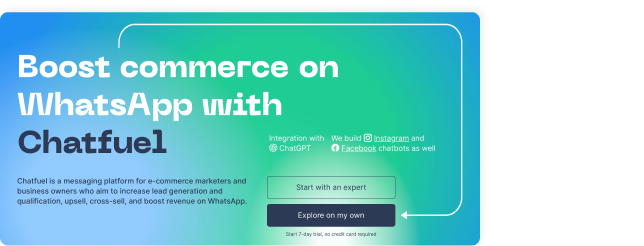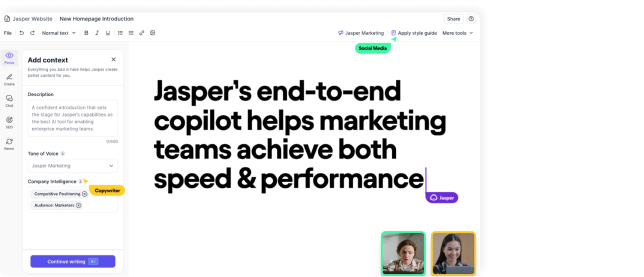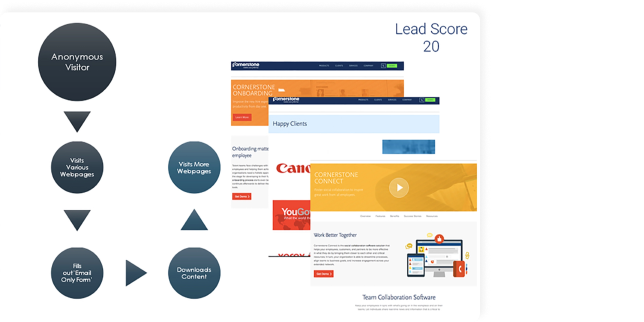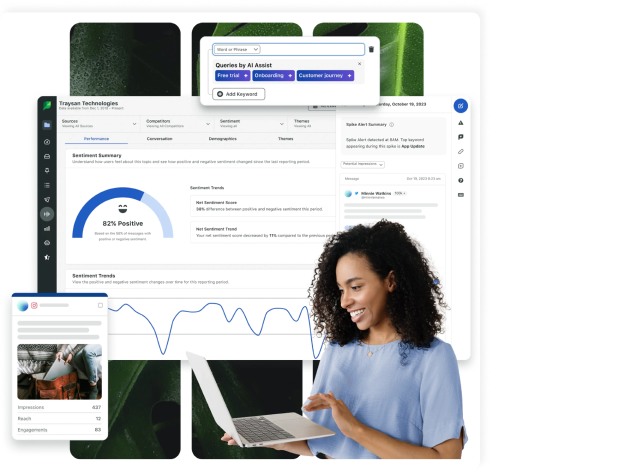
AI marketing automation: benefits and examples
Stay ahead of the competition with the help of AI-powered marketing automation: explore tools, ways to use them, and examples.
Marketing is the fastest-moving business area in almost any company. Unlike, say, accounting or customer support, in marketing, you always need to be on the bleeding edge to stay competitive. This includes adapting to new technologies and strategies. Artificial Intelligence (AI) is the latest step in this evolution, with thousands of tools, methods, and ways that it can be leveraged.
AI marketing automation, as a subset of that, has proven to be most effective. Businesses can harness a level of personalization that has never been possible before, yet it is essential in today’s world.
In this article, we’re going to help you stay ahead of the competition with the help of AI powered marketing automation. We’ll go over what it is, the tools that make it possible, ways to use them, and specific examples.
Let’s get started.
AI in marketing
AI and marketing are now so intertwined that it’s hard to avoid using AI in your daily work. Based on Statista’s recent reports, 80% of industry experts have already integrated some form of AI technology in their online marketing strategy.
From data analytics to customer relationship management, AI is powering personalized marketing campaigns and real-time decision-making. It’s revolutionizing how brands interact with customers by using data patterns that the human eye might miss.
What is marketing automation?
Marketing automation is the use of technology to automate marketing tasks and processes. Think of email marketing, social media posting, campaign tracking, and customer data analysis, among other tasks.
The goal is to increase efficiency, save time, and personalize customer interactions, leading to better results and customer satisfaction. With AI, marketing automation becomes not only faster but smarter, providing insights and actions based on data-driven analysis.
AI tools for marketing automation
Here are the best examples of AI tools we’ve identified for marketing automation:
- Chatbots and virtual assistants
Companies like Chatfuel allow you to engage customers 24/7 with personalized, conversational experiences. It’s great for the customer because they get help quickly, and it is great for the business, which can drastically cut its customer support and sales expenses.
- Content creation tools
With AI companies like ChatGPT and Jasper AI, you can automatically produce relevant and engaging content for any platform. AI can write content based on trends, user preferences, your target audience, and business goals.
- Lead scoring software
AI tools can rank leads based on their quality, automatically nurture them with emails or other forms of messaging, and transfer them to the appropriate team when it’s time for a human to jump in. It can also tailor the lead generation and nurturing process, deciding when and what content should be sent to prospects based on their profile or actions.
- Email automation tools
These are the most commonly used types of marketing automation tools. They use AI to enhance email automation by personalizing emails, determining ideal send times, and analyzing performance in real time.
- Social media monitoring and engagement tools
AI tools can monitor your social media accounts for brand mentions, DMs, and customer feedback. They can engage customers by responding to comments or questions, helping you maintain an active social media presence.
Keep reading to find out ways to use AI in marketing automation, as well as specific examples of companies doing it.
Ways to use AI in marketing automation
There are many tools out there, which is great, but how do you leverage them in your campaigns?
Let’s go over some ways to use AI in marketing automation.
Personalize customer experience. Use AI to analyze customer data, preferences, and behavior to tailor every aspect of the marketing experience. This could mean personalized product recommendations on eCommerce sites, dynamic content in emails, or chatbots that provide user-specific assistance. Personalization is what makes customers feel understood and valued, which increases their loyalty.
Enhance user engagement. AI helps in creating content and engaging with customers in a way that humans can’t, or don’t have the time to. Whether that’s through more compelling email subject lines, quick replies, or timely social media posts, use AI to turn passive viewers into active customers.
Improve marketing efficiency. Analyze your marketing team's weekly tasks and calculate how much time each of them takes. Now, identify which tasks you can accomplish faster using AI. This could be writing email copy, drafting blog outlines, reporting, or data entry. By getting more efficient at these tasks using AI, you can focus more on the strategy and creative aspects of marketing.
Grow your revenue per customer. AI can significantly increase revenue per customer by identifying upsell and cross-sell opportunities, optimizing pricing strategies, and creating personalized offers that are more likely to convert. Use AI’s predictive capabilities to anticipate customer needs and provide them with solutions before they even realize they need them.
Examples of AI in marketing automation
Chatfuel’s AI-powered chatbots
Chatbots used to be good, but now, with the help of AI, they’re that much more powerful. Chatfuel is integrated with ChatGPT, so their chatbots can interact with customers in human-like conversation. They can be trained on company data, goals, product information, and other guidelines.
Chatbots can be deployed on your website, Messenger, Instagram, WhatsApp, and more. Companies using Chatfuel include Lego, Adidas, Netflix, Visa, and millions more.

Using Jasper AI for content writing
Content creators and marketers use Jasper AI to produce high-quality content efficiently. Jasper AI can generate full articles, social media posts, and marketing copy that resonates with audiences. It adapts to the user’s style and continues to learn from feedback, making content creation more efficient. Jasper AI is used by companies like ZoomInfo, Wayfair, and others.

Marketo’s lead scoring
Marketo uses AI to score and prioritize leads based on their likelihood to convert. They track user behavior on the website, attach that information to an email, and when a lead is considered ‘qualified’, they’re sent to the sales team.
What’s important is that Marketo helps you identify when leads are actually ready to talk to you. They’re much more likely to convert later in the buyer’s journey, which is what Marketo essentially tracks. Their customers include Lenovo, VMware, Coles, and many more.

Sprout Social for social media management
Sprout Social uses AI algorithms to help businesses monitor social media conversations, track brand mentions, and understand how the audience feels about them. Its AI capabilities enable quick responses to messages, comments, and trends, keeping the brand’s social media active and engaged. Companies using them include Canva, Square, Eventbrite, and more.

To conclude, AI marketing automation is here to stay. It’s not some futuristic concept but rather a present reality and necessity in any modern business. Marketers must embrace these new tools to stay ahead of the curve.
These are tools that will only improve over time and offer more and more advanced capabilities. Staying informed and adaptable is key in this industry, and we hope that we’ve helped you with that today.
AI marketing automation: FAQs
What is the best AI tool for digital marketing?
The best AI tool for digital marketing is an AI chatbot like Chatfuel. Because it increases customer satisfaction, boosts sales, offers quick replies, and allows you to cut costs.
However, the answer may be different based on the business that’s asking the question. It depends on their specific needs, industry, and objectives. Each AI tool offers unique benefits and features.
How is AI being used in marketing?
AI is used in marketing through personalization, predictive analytics, customer engagement, content creation, and campaign management. But there are more use cases as well, as AI continues to pave the way for new possibilities every day.
What are the benefits of AI marketing automation?
The benefits of AI marketing automation are increased revenue and reduced costs. These benefits are possible through increased efficiency, enhanced personalization, automation, informed decision-making through predictive analytics, and enhanced customer experiences.
